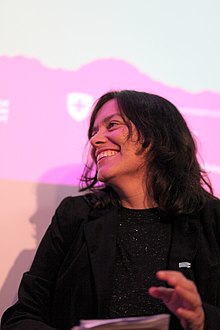Sara Ahmed | |
|---|---|
 Ahmed lecturing in Geneva in 2019 | |
| Born | 30 August 1969 Salford, England |
| Nationality | British and Australian |
| Alma mater | |
| Occupation(s) | Writer, professor, independent feminist scholar |
| Known for | Feminist theory, lesbian feminism, queer theory, critical race theory, postcolonialism, affect theory |
| Website | www |
Sara Ahmed (born 30 August 1969)[1] is a British-Australian writer and scholar whose area of study includes the intersection of feminist theory, lesbian feminism, queer theory, affect theory, critical race theory and postcolonialism. Her foundational work, The Cultural Politics of Emotion, in which she explores the social dimension and circulation of emotions, is recognized as a foundational text in the nascent field of affect theory.[2][3][4]
- ^ "Ahmed, Sara, 1969-". Library of Congress. Retrieved 16 January 2015.
data sheet (Ahmed, Sara; b. 08-30-69)
- ^ Athanasiou, Athena; Hantzaroula, Pothiti; Yannakopoulos, Kostas (2008). "Towards a New Epistemology: The "Affective Turn"". Historein. 8: 5–16. doi:10.12681/historein.33. ISSN 2241-2816.
In such a spirit of questioning, Sara Ahmed has developed a groundbreaking theory of the cultural politics of emotion, one that interweaves emotions, language and bodies while attending to the intersections of gender, race, class, sexuality and nation.
- ^ Harrison, Guy (2021). On the Sidelines: Gendered Neoliberalism and the American Female Sportscaster. U of Nebraska Press. p. 111. ISBN 978-1-4962-2742-3.
Ahmed's volume has become a foundational text in an emerging field in cultural studies known as affect— with a sound similar to that in the word acting—which seeks to investigate the way emotions impact individuals, institutions, and society at large.
- ^ Cuddon, J. A. (7 November 2012). A Dictionary of Literary Terms and Literary Theory. John Wiley & Sons. ISBN 978-1-118-32600-8.
Some of the most important publications include Lauren Berlant, Cruel Optimism (2011); Eve Kosofsky Sedgwick, Touching Feeling: Affect, Performativity, Pedagogy (2003); Paul Gilroy, After Empire: Melancholia or Convivial Culture? (2004); Sara Ahmed, The Cultural Politics of Emotion (2004);